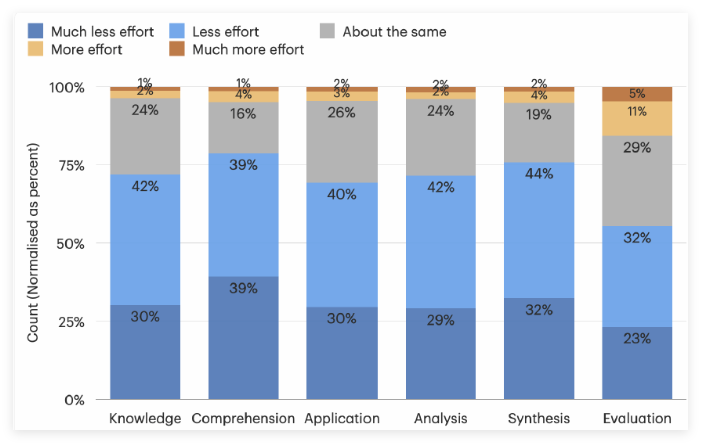A recent study by Microsoft and Carnegie Mellon University suggests that excessive reliance on artificial intelligence (AI) tools may be eroding people's critical thinking abilities. The research team surveyed 319 knowledge workers and collected 936 real-world examples of generative AI usage across various industries, including IT, design, administration, and finance. The study analyzed six dimensions of critical thinking: knowledge, understanding, application, analysis, synthesis, and evaluation.

The study found that after using AI tools, there were three significant changes in people's thinking when solving problems. First, knowledge workers no longer independently gather information but primarily focus on validating AI-generated results; second, they are more inclined to integrate the answers provided by AI rather than develop solutions independently; finally, many individuals have begun to monitor AI systems instead of directly executing tasks. This trend is particularly evident when handling routine or less important tasks, where people may rely on AI without questioning it, raising concerns about long-term dependence and a decline in independent problem-solving abilities.
The research team mentioned a phenomenon called "automation irony": while AI handles routine tasks and reduces people's workload, it simultaneously deprives them of opportunities to exercise their judgment and "cognitive muscles." This phenomenon of "cognitive outsourcing" may gradually weaken people's natural abilities.
Interestingly, the study also found that confidence may protect individuals' critical thinking abilities to some extent. Employees who are more confident in their abilities tend to maintain a skeptical attitude towards AI outputs. Although researchers could not definitively establish a causal relationship, three main factors drive people's critical thinking: the desire to improve work quality, the motivation to avoid mistakes, and personal development needs. However, time pressure, lack of problem awareness, and difficulties in improving AI responses in unfamiliar areas are barriers that affect this ability.
The research suggests that companies should actively promote employees' critical thinking by providing specialized training on how to review AI results. At the same time, the design of AI tools should be more geared towards supporting rather than replacing critical thinking.
Additionally, an independent study by a Swiss business school found that young people aged 17 to 25 have the highest usage rate of AI tools but scored the lowest in critical thinking tests. Educational level also emerged as an important protective factor, as individuals with higher education levels are more likely to question AI-generated information while maintaining stronger critical thinking abilities when using AI tools.
Key Points:
💡 The research indicates that excessive reliance on AI tools may lead to a decline in critical thinking abilities.
🔍 Workers are more inclined to validate AI results rather than engage in independent thinking or problem-solving.
📈 Confidence and educational level are considered important factors in maintaining critical thinking.










